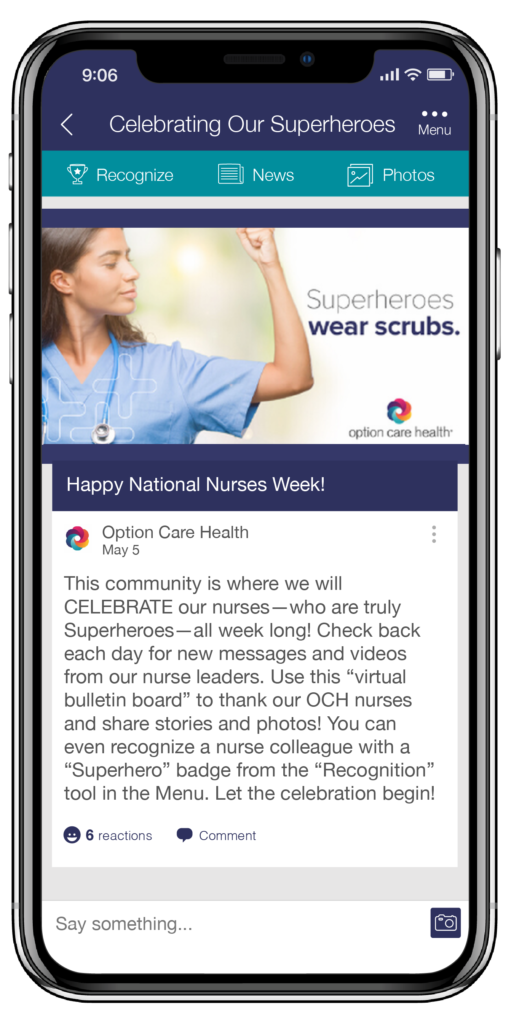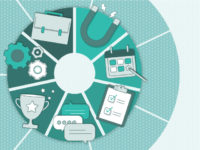How do you provide healthcare employees with a deeper connection to their work lives?
The answer, lies in the employee experience (EX).
EX is a tough nut to crack. As an emerging concept, it’s difficult to encapsulate in a single sentence, but here at Bonfyre, we like to simplify it down to this: EX is about the relationships an organization creates with employees.
These relationships are based on various elements that employees interact with every day at work, including the technology that they use.
But when it comes to technology, healthcare employees are inundated with tools and software that are positioned as time-savers and productivity boosters. And while that is certainly true for some tools, most of them are usually centered on maximizing employee output without much focus on the emotional and social aspects of EX.
Relationships are foundational to EX in healthcare
EX can be broken down into three main domains: the Procedural, Textural, and Emotional. Relationships fall into the Emotional EX—the domain that concerns how we think about, interact with, and understand our work environment. Emotional EX is perhaps the most significant of the three domains since our emotions tend to be the defining factor in how we evaluate our experiences overall.
Gallup research makes a strong case for strong work relationships. Having a “best friend” at work, or at least a close confidant, is not only important for our mental well-being but also positively contributes to one of the most important elements in work relationships: trust. When we have close, trusting relationships with coworkers, we feel more supported, more likely to be engaged, and more committed to our work. It also offers benefits such as knowledge sharing, cross-collaboration, and the breaking down of information silos.
When it comes to building workplace relationships, there are two primary factors that influence the level of connection: interaction, which is how often people communicate, and relatedness, which is how much two people have in common. Of course, knowing what we share in common with coworkers is dependent on the number of interactions we have.
Unfortunately, it isn’t always easy to build these types of supportive relationships, especially in healthcare organizations where some employees may never have the opportunity to interact one-on-one with coworkers in different teams, departments, or locations.
In order to reap the benefits work relationships bring, companies should invest in technology that goes beyond pushing for productivity and instead focuses on building real, meaningful connections between employees.
Bonfyre helps create connections that matter
Bonfyre’s mission is to strengthen and support workplace communication and connections for healthcare workers. No matter how or where your employees work, Bonfyre provides a space for them to achieve the aforementioned factors of interaction and relatedness that lead to stronger bonds.
Many of our healthcare clients have found success in connecting and engaging employees with the help of Bonfyre’s communication and feedback features.
Two-way communication gives everyone a voice
Even in our personal lives, we can attest to the fact that one-sided relationships aren’t very fulfilling and certainly don’t inspire trust. That’s why we’ve focused on providing our healthcare clients with a communication tool that not only allows them to share information but also receive feedback in real time, from all employees.
When your workforce knows they have the ability to openly express their opinions with both colleagues and leadership, it builds trust, a stronger link to your company, and an overall more positive employee experience.
Communities help create stronger bonds

Our healthcare clients have found a solution to these challenges with the help of Bonfyre’s community features.Employees can create and join “communities,” which are essentially groups formed around departments, roles, locations, and shifts. Inside these communities, employees can chat, share photos and videos, and generally get to know one another on a deeper level.
Communities don’t have to be just about work, though—many are based on employees’ core identities or interests, such as communities for LGBTQ+ employees, young professionals, running enthusiasts, amateur cooks, and so forth. Even if employees in these groups don’t have the opportunity to interact often in person, they can still build meaningful connections based on common interests.
Customized recognition makes an impactAnother element of relationships and Emotional EX is recognition. We all know that receiving praise for a job well done feels good and inspires confidence. And when it comes to workplace recognition, it’s the driving factor in making us feel like our work is seen and valued, and ultimately leads to a greater sense of belonging.
However, most healthcare organizations rely on macro-recognition programs that are often outdated, lengthy, and generally come in a top-down manner where only management has the ability to recognize employees.
Bonfyre’s micro-recognition tool is designed to overcome these obstacles by giving both management and peers the ability to recognize and celebrate achievements. There’s no drawn-out process involved, either, so recognition occurs in-the-moment for maximum impact. Best of all, Bonfyre’s recognition badges can be customized to give a deeper, more personal touch to the recognition being given, something that our healthcare clients have found to be exceptionally useful (update link to this reworked article for healthcare) in boosting morale and showing genuine appreciation.
Feedback guides your strategy
Feedback is a critical component of any EX strategy. Without knowing how your employees actually think and feel about their work experiences, you’ll have no way of knowing what they truly want and need, or whether any changes you make actually bring about results.
Bonfyre’s platform comes equipped with easy-to-use quick polls and multi-question surveys that allow our healthcare clients to gather this necessary feedback directly from employees. Because Bonfyre is accessible 24/7, employees can respond to surveys whether they’re in an office, on the frontlines, or on-site with a patient. In a matter of hours, healthcare organizations have access to valuable, confidential feedback that can be used to guide their EX strategies and make real changes.
Overall, our healthcare clients have found that Bonfyre is a valuable investment for boosting the strategies they’re already using to improve communication, engagement, and relationships in the workplace. By providing a dedicated space for genuine employee interactions, clients are able to demonstrate to employees that they recognize the importance of the Emotional EX and fostering an environment based on trust and communication.



 6 min
6 min




